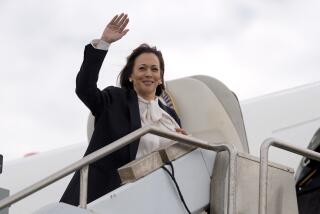Bradley Takes Stand on Free Trade Issue
- Share via
NEW YORK — With his campaign about to move westward to Washington state, where free trade has become the subject of debate, Bill Bradley proposed Wednesday that workers whose jobs are swallowed up by trade agreements be given cash payments.
The former New Jersey senator said his economic policy would continue the nation’s record-long economic growth while allowing the poor to participate in the boom.
In an unorthodox maneuver, he is hoping a victory in Washington’s nonbinding primary Tuesday will fuel a surge of support in crucial contests a week later in California and New York.
Vice President Al Gore, meanwhile, also presented a new initiative: a 10-year, $35-billion program to help the elderly pay for “catastrophic” prescription drug costs.
The vice president described his “MediCoverage” plan as the “third great pillar of health care for seniors,” standing with Medicare and Medicaid.
“We’ve made so much progress. But we need to make more progress,” he said.
Gore discussed the program, which he said fits within the confines of a balanced budget, in a midday speech at a sprawling seniors retirement center in Deerfield Beach, in South Florida.
Bradley, speaking to about 500 people at Columbia University, acknowledged that the nation’s “economic performance has been spectacular.”
But, he said, “despite all our success, far too many Americans are on the outside looking in.”
His answer: Providing the poor with government vouchers in the form of what he called “Infostamps” that could be used to buy computers and Internet access, thus closing the already-shrinking “digital divide” between rich and poor.
“Just as we provide food stamps to help needy Americans, we can provide Infostamps to prepare them to flourish in the information-driven new economy,” Bradley said.
Tackling the same issue last week, Gore said his administration would help every home gain high-speed Internet access.
Bradley introduced his proposal in a debate Monday with Gore, but it was largely ignored in the highly contentious atmosphere that night.
Each stamp, he said, would be worth $400--enough, he suggested, despite the still higher costs generally charged for computers and Internet access, to pay for computer hardware, software and the fees charged for Internet connections.
He predicted that the program would cost the government $100 million.
Washington state has become a focal point of arguments over free trade, and Bradley acknowledged the controversy that accompanies allowing other nations greater access to U.S. markets. But he said globalization is vital “to a balanced transition from growth to prosperity.”
Under his worker protection proposal, the government would reimburse half of a worker’s lost wages for three years. If a worker lost a $45,000-a-year job and was able to find one paying $25,000, the government would add $10,000 annually.
Bradley estimated the program would cost the government $200 million. Eric Hauser, his spokesman, said the money would come from the budget surplus.
Under Gore’s pharmaceuticals proposal, the estimated 13 million low-income Medicare recipients would receive free prescription drug coverage. Wealthier seniors would get government-subsidized discounts.
Gore’s plan calls for Medicare recipients with incomes below 135% of the poverty level to receive 50% of prescription drug costs up to $5,000.
Those with annual drug costs above that level must pay the next $1,500, after which the government would pay for full coverage.
According to the Gore campaign, the prescription drug bills of approximately 90% of Medicare beneficiaries are less than $5,000.
“At a time when prescription drugs are at the forefront of modern medicine, we need a health care system that treats them as a medical necessity, not a luxury,” Gore said.
*
Johnson reported from New York and Chen from Florida.
More to Read
Get the L.A. Times Politics newsletter
Deeply reported insights into legislation, politics and policy from Sacramento, Washington and beyond. In your inbox three times per week.
You may occasionally receive promotional content from the Los Angeles Times.









